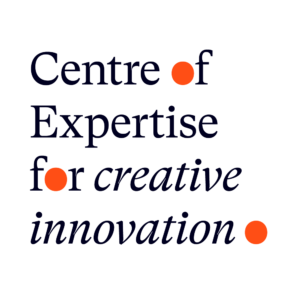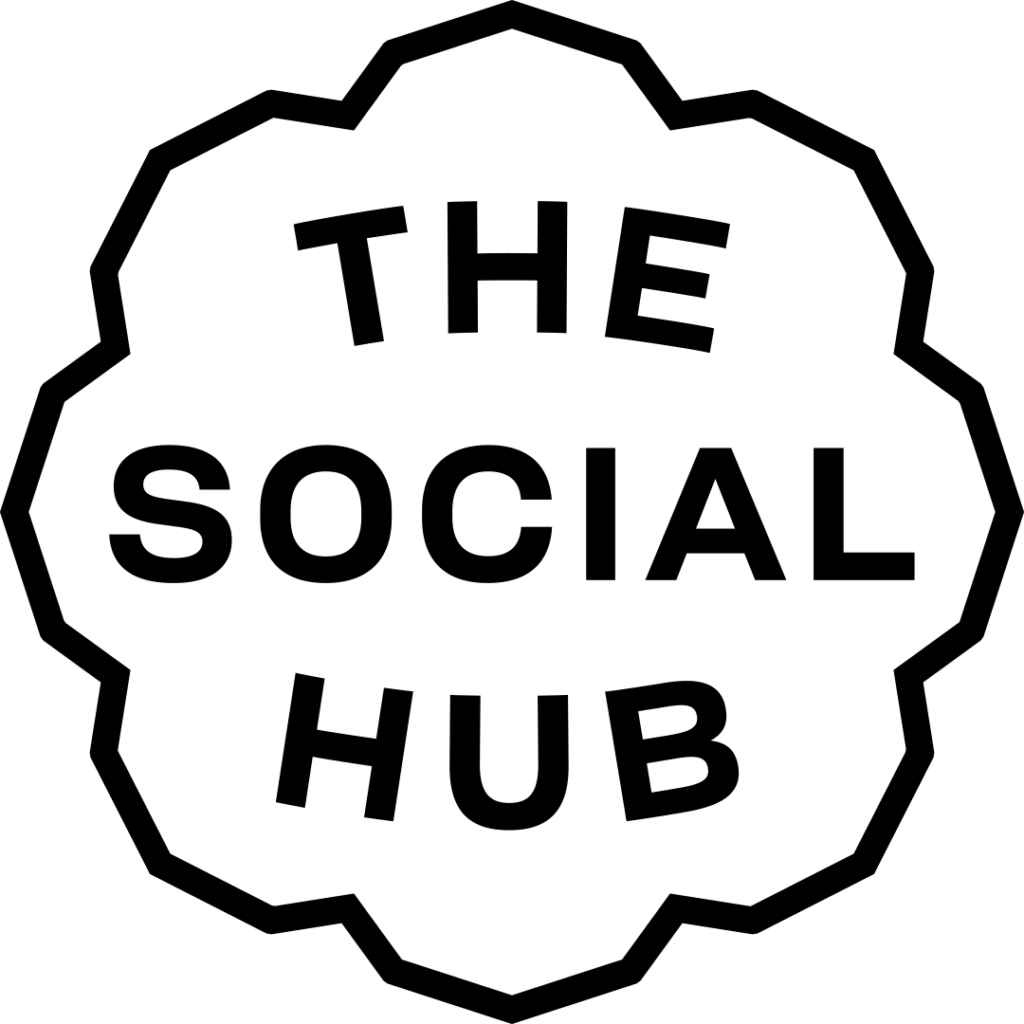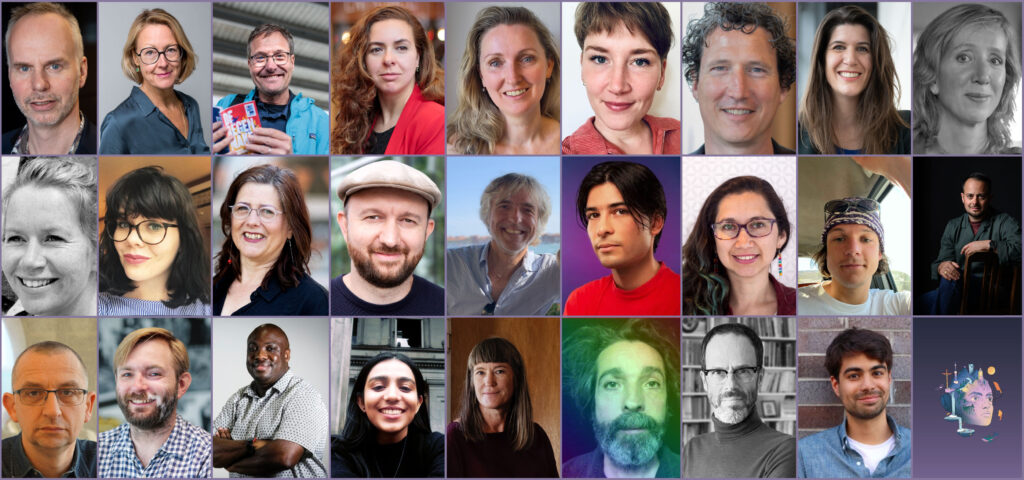LearnWorlds
Society 5.0 Online Course
How can the creative industry help guide technological innovations towards the planet’s well-being?
Course overview
Society 5.0 Festival: Creativity, Care, Connect
We are on the verge of a fifth societal revolution, driven by technologies such as artificial intelligence, robotisation and extended reality.
How can the creative industry help to guide these innovations towards the well-being of the planet? And what role can creative professionals, like designers, (policy) makers, artists, technologists, hackers, and researchers play to ensure a society based on public values and positive impact?
We invite you to join us on our journey of providing multiple perspectives to these questions and to explore your own spark for participation!
The online course is designed around six thematic tracks – Speculative Futures, Generative Storytelling and Creativity, More than Human, Digital Rights, Inclusive Participation and Wellbeing in a Digital Age – designed by curators and thought leaders in their respective fields. No matter if you attended the Festival or if this is your first time getting acquainted with the topics of Society 5.0, the course will provide ample opportunities for inspiration and food for thought.
The Society 5.0 Festival and online course is powered by the Centre of Expertise for Creative Innovation (CoECI), Digital Society School of the Amsterdam University of Applied Sciences and The Social Hub.


See you in 2024 at the next edition of the Society 5.0 Festival!
Format of the course
- The course is made up of stand-alone modules which are designed according to the six thematic tracks of the Society 5.0 Festival. Each module starts with an introduction video by the respective curators, followed by a video of a guest speaker. The module ends with additional resources for you to follow, as well as some reflection questions to help you organise your thoughts and apply your learnings.
In addition to the modules, there is extra video material from some of the other speakers who were present at the festival.
This is a self-paced course and we encourage you to freely experience it in your own way, without necessarily following suggested structure.
Learning Outcomes
After successful completion of the course, participants should be able to understand:
- What role an individual can play to ensure a society based on public values and positive impact
- What design approaches and creative methods can be used to think of society as a system of interconnected elements
- How to consider different ways to imagine alternative, digital futures of an inclusive nature
Certification
A certificate of participation, issued by Digital Society School (part of the Amsterdam University of Applied Sciences) and the Center of Expertise Creative Innovation, will be sent to successful participants who complete the course.
For whom is this course?
The course is meant for
Creative Professionals, Policy Makers, Innovators, Educators and Students who are interested in exploring more about the topic.
Questions you may have
Meet the Guest Contributors

Kees Klomp is a lecturer on Purpose Economy at the Rotterdam University of Applied Science, an activist, an author of several books on Purpose Economy, including a children’s book, and a founding partner of Thrive. Before all this, Kees worked at leading creative agencies, like Young & Rubicam and TBWA.
Henry Cooke is a Lead Foresight Researcher at BBC Research & Development. He has three main areas of focus: exploratory prototyping on emerging media platforms & devices, research on feedback loops between technology and culture, and futuring methods for extrapolating trends and anticipating changes in our audiences and their media, technology and social landscapes.
Ian Forrester works for the BBC’s R&D north lab where he focuses on open innovation and new disruptive opportunities via open engagement and collaborations with startups, early adopters and hackers. His current research is into the area of Future Narrative and Storytelling, with a technology he calls Perceptive Media. A new kind method of broadcasting, which pairs the best of broadcast with the best of the internet to create an experience like sitting around a camp fire telling stories. Interestingly this also crosses over into internet of things too.
Ignacy Radtke (Iggy) is a visual artist, based in Amsterdam. His multidisciplinary practice is focused on installations and objects. He is a curious observer and an active narrator. In his works he likes to play with the illusion of reality, like to question the credibility of what we see and question the difference between looking at and seeing. He is a sensory explorer fixed about the tactility, smell and scale of the surroundings. His works are known for high precision and neat finish.
Fabrizio Valpreda is architect, designer and associate professor of design at Politecnico di Torino. His background is based upon the co-existence of the analog tradition merged with the digital innovation, being him a digital immigrant and an early adopter of the IT revolution potentials in Design development. He works on research and education between digital innovation and analog tradition through Open Design, thus creating new connections between the micro-production methodologies and the new methods offered by the Fablabs typical collaborative approach, with the primary target to create connection between skills in new multidisciplinary environments. Scientific manager of virtuaLAB – Design, a digital lab for design visualization, 3D printing and Interaction Design, he is also member of the Polytechnic of Turin ICT board, academic mentor of Fablab Torino and Design delegate at Teaching and Language Laboratory – Polito (TLLab).
Maria Göransdotter is associate professor at the Umeå Institute of Design, Umeå University, with a PhD in industrial design and an academic background in the history of science and ideas. She works in the intersections of design historical and practice-oriented design research, exploring transitional design histories as a way of opening up conceptual spaces for thinking and doing design differently. She is part of the artistic research environment Design after Progress: Reimagining Design Histories and Futures.
Mugdha Patil is a PhD Candidate with the DCODE Network, based at the Amsterdam University of Applied Sciences and TU Delft. Her research focuses on exploring future practices for designing for and with AI that are decolonial. With a background in industrial design and citizenship studies, she seeks to combine tools of criticality and speculation to explore how designers can make sense of histories to inform future AI narratives that are plural, political, situated, and mutating.
Matt Adams co-founded Blast Theory in 1991, an artists’ group making interactive work. Blast Theory is renowned for its multidisciplinary approach using new technologies in theatre, games and visual art. The group has collaborated with scientists at the Mixed Reality Lab at the University of Nottingham since 1997. Matt has curated at Tate Modern and at the ICA in London and has taught widely. He has lectured at Stanford University, the Royal College of Art and the Sorbonne. He is a winner of the Maverick Award at the Game Developers Choice Awards. He was the Visiting Professor in Interactive Media at the Royal Central School of Speech and Drama from 2007 to 2014.
Martin Howse is occupied with an investigation of the links between the earth (geological and geophysical phenomena), software and the a/human psyche (psychogeophysics) through the construction of experimental situations (performance, laboratories, walks, and workshops), material art works, instruments, fictions, texts and software.
Mounir Samuel is a multidisciplinary artist, renown journalist, author, documentary film maker, museum curator and cultural entrepreneur working on the cutting edge of climate, politics, media, culture, art, language, gender, religion and geography. He is notorious for his work on social change, and is considered one of the most provocative thought leaders of the Netherlands. Winq Magazine rewarded him with the honorary title of ‘Changemaker of the Decade’. For more information visit his website.
Ruben Baart works as the editor-in-chief at Next Nature. With a background in new media and design, Ruben obtained his Master’s degree in Visual Strategy. With a broad interest in technological developments and their impact on the society as a whole, he is considered a human radar for all next nature related topics and themes.
Tamara Pinos Cisneros is a PhD candidate and educator with the Amsterdam University of Applied Sciences and the University of Twente. Her research and education activities focus on the creative use of technology in different fields.
Andy Sanchez is a Senior Researcher in Society, Media, & Technology at the Sustainable Media Lab. His work considers the ethics and regulation of disruptive technologies, and in particular, how we can safeguard human rights as our society becomes increasingly digital. In pursuit of these goals, he has published policy memos, Op-Eds, and press releases, and he has also advocated to U.S. Congressional offices. He serves as the Editor-in-Chief for Special Editions at the Journal of Science Policy & Governance, which publishes articles by early career researchers at the intersection of science and policy. He received his Ph.D. in Chemical & Biomolecular Engineering from Cornell University, where he developed a novel method for monitoring infectious diseases, and his MFA in Creative Writing from New York University. He was formerly the Co-instructor for Cornell’s Science Policy Bootcamp, where he helped students pursue advocacy on a range of topics, including municipal composting, misleading food labels, and ethics dumping. He has extensive teaching experience, as well as expertise in translating scientific material for general audiences. He is passionate about using science as one tool of many to advocate for social justice.



